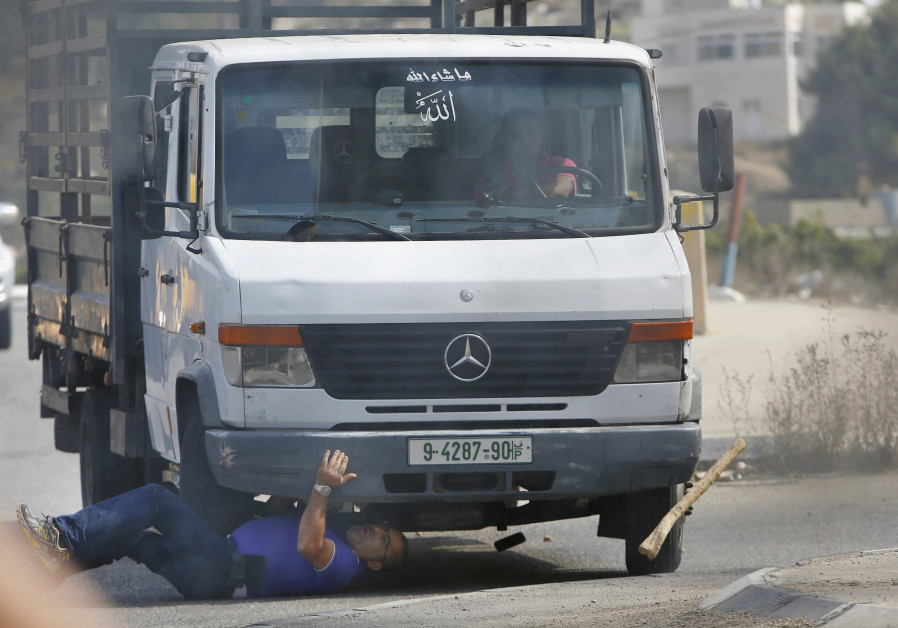Ex-IDF chief prosecutor: Superior changed indictment under pressure

A Palestinian vehicle rams into Israeli Avraham Hasno, who died later, in Hebron. (photo credit: MUSSA QAWASMA/REUTERS)
The IDF chief prosecutor changed the charge against the Palestinian who ran over a Jew in the West Bank during the “knife intifada” from manslaughter to murder due to outside pressure, former IDF chief West Bank prosecutor Lt. Col. (res.) Maurice Hirsch told the Jerusalem Post on Wednesday.
Hirsch’s revelation came after the Judea Military Court convicted Mahmoud a-Titi of murder for running over Avraham Hasno in October 2015. The event happened at the height of the intifada and under complex circumstances, which led Hirsch to originally charge a-Titi with mere manslaughter.
While Hirsch said that he must bow his head to the decision of the court with its murder conviction, he still thought it was important to voice problems with then IDF chief prosecutor Col. Sharon Zigagi, who changed the the charge under pressure from Hasno’s family.
Hirsch told the Post that, “this decision to change the charge was made solely because of the pressure of the family. At the time, there was no precedent for basing the indictment.”
Murder can only be the charge if there was a specific intent to kill. Manslaughter is the charge for killing because of recklessness or a spontaneous decision to generically harm someone without realizing that the result will be death.
According to Hirsch, “The Hasno family met with chief IDF prosecutor Sharon Zigagi. I was not invited to this meeting. I only learned about the meeting after it would have been impossible for me to get to the meeting in time from Camp Ofer.
“The IDF chief prosecutor then decided, without checking in with me and without asking further questions, – to change the charge,” to murder,” Hirsch continued.
Afterward, Hirsch said that, “She then agreed to hold an additional meeting with me due to my adamance. But even this meeting was just ‘for the record.’ A decision had already been made and no one was even considering changing it.”
He added that there was a website that said he had changed the charge in the indictment “because of my political views – this was completely untrue,” he said. “It happened to be that shortly after [changing the charge] a new decision [by the courts] was made [that could support a murder charge], but this was not known when the decision to change was made.”
An IDF source said that the Judea Court’s decision, currently under gag order, specifically repudiated the claim of improper outside pressure by the family as being the basis of the decision. Further, the source cited that the court’s decision supporting the Zigagi should be all the proof needed that Zigagi made the right decision.
In addition, there were implications that even when Zigagi made her decision that there was a rising trend in the law to seriously take into account relevant evidence presented by victims’ families, as well as the broader circumstances of a killing.
Hirsch said that he cannot reveal the reasons why he supported a manslaughter charge as opposed to a murder charge until the appeals process is exhausted so as not to influence the case.
The defense had argued that what happened was an accident or at the very least a bizarre spontaneous event, that could not be called planned.
Hasno got out of his car on the West Bank road where the incident occurred because Palestinians were throwing rocks at his car. A-Titi was driving on the road and road over Hasno.
Based on the complex circumstances, the IDF prosecution charged a-Titi with manslaughter. However, there was a media and political uproar over the lenient charge and it was eventually changed to murder.
Ironically, Hirsch, who currently works for Palestinian Media Watch and represents many families of Jewish victims of terror, is usually thought of as right-wing in his leanings. However, in this case, which occurred while he was still bound by his IDF oath, Hirsch fought to obtain a more lenient charge.
`; document.getElementById(“linkPremium”).innerHTML = cont; (function (v, i){ });





Comments are closed.